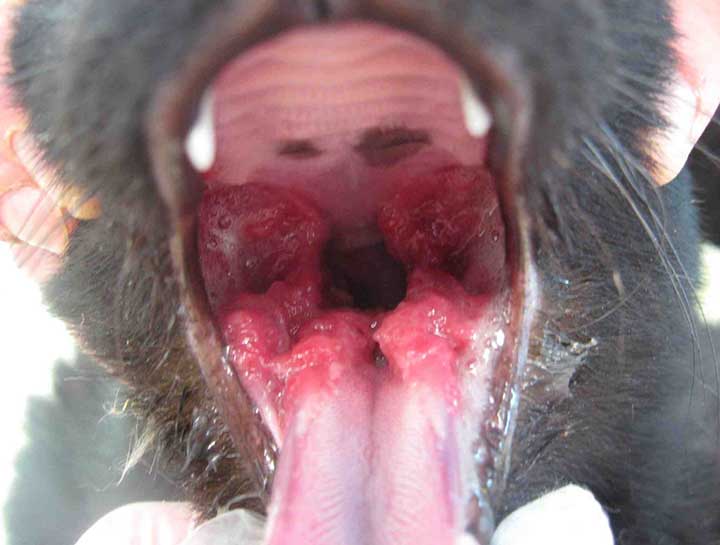Oral Stomatitis
Chronic inflammation in the soft tissue of the mouth.
Stomatitis is an inflammation of the soft tissues in the mouth. In cats, the disease is Chronic Ulcerative Gingivostomatitis (CUGS) and in dogs it is Chronic Ulcerative Paradental Stomatitis (CUPS).
Over time, the soft tissue becomes infected, inflamed and ulcerated, and extremely painful. In cats, oral structures of the mouth affected by the disease can involve not only the gums but the buccal mucosa covering the cheeks (extending into the back of the throat), the tongue, hard palate and soft palate. Cats can also develop a specific pathological syndrome called Lymphocytic-plasmacytic Gingivo-stomatitis (LPGS), a very serious disease that results in extreme mouth pain and poor quality of life for the animal.
Veterinarians will often prescribe steroids and antibiotics in an attempt to ameliorate the disease. While these drug combinations may slow the pace of the disease they may become insufficient in halting the progression. The patient’s quality of life is then compromised with intractable pain and eating can become difficult. Most of these patients require aggressive surgery, with extractions of all teeth performed to prevent the recurrence of inflammation.
During the extraction process it is important that all retained roots are removed, requiring full mouth x-rays post-extractions, alveoplasty (selective bone removal), and buccal flaps to close the exposed bone and sockets. This is a labor-intensive surgical procedure that should be done by a veterinarian with expertise in this disease. Many patients will require some medical management to keep the disease in remission after surgery.
Cats that have CUGS or LPGS require a thorough examination and workup before initiating surgery. This includes a blood test to check organ function and screening tests for feline leukemia and feline immunodeficiency virus. Although specific organisms such as Bartonella bacteria and feline calici virus have been implicated in this disease, there is insufficient evidence to support the conclusion they are the cause of it. There is testing available for the detection of bartonella and the antibiotic azithromycin has been effective in treating this bacteria.
Unfortunately most patients will ultimately require tooth extractions as described above. There are experimental treatments being investigated to treat CUGS and LPGS – such as stem cell therapy, laser surgery and radiowave radiosurgery bone treatment – but we do not provide these treatments, as there is a lack of clinical data to support their value.
The stomatitis in dogs known as CUPS is less serious than in cats but results in ulcers or “kissing lesions” on the buccal mucosa (tissue inside the cheeks), halitosis, mouth pain, and sometimes ulcers on the sides of the tongue. The ideal workup for this disease is x-rays of teeth in the affected areas of inflammation, and biopsy of the ulcers in the buccal mucosa. Treatment requires regular professional subgingival cleanings, extraction of diseased teeth, vigorous home care with brushing, and mouth rinse agents specifically designed to reduce mouth bacteria.
Call us at (530) 272-6651 today to schedule your pet's next dental exam!

